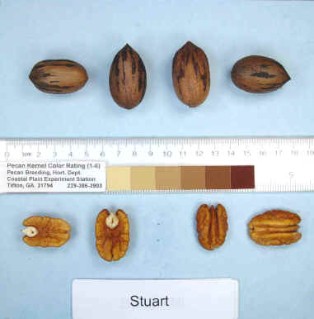By Clint Thompson
Stuart pecan varieties have a history of an interrupted and prolonged shuck split. This has been magnified under the current conditions that show a heavy crop load and dry soils.

It is very similar to 2016, says Lenny Wells, University of Georgia (UGA) Extension pecan specialist, in his UGA Pecan Extension Blog. Wells said growers are concerned about Stuarts not opening up in a timely fashion.
“We were having the same issues in 2016; same conditions, these dry soils after kernel filling is complete. When that happens, we have this problem. Stuarts are prone to this prolonged shuck split any way, and the stress generated by those dry soils for such a long period of time just amplifies it. They’ve got to have water, soil moisture for that shuck split process to occur like it’s normally going to work,” Wells said.
Irrigation Needed
Wells encouraged growers to continue irrigating their Stuart pecans at about 6 to 8 hours every other day or 50% of capacity to help the nuts to open.
“Just keep watering. If they have some that are open and it’s enough open where they can bump them really lightly to get a few off, that may help the rest open up,” Wells said. “I wouldn’t shake them really hard, because you’ll have a lot of green nuts coming down, and they’re going to need the volume this year if the prices don’t change.”
The air humidity and temperatures have been low which saved growers from experiencing more sprouting or premature germination with their crop.
“The normal maturity date (which is estimated as 50% shuck split) for Stuart is Oct. 20. So, we are a little delayed, but with the extreme dry conditions we have suffered since late August and early September, this should come as no great surprise,” said Wells in his blog. “The shuck dehiscence (shuck split) process requires water to function properly. Even with irrigation, it can be hard to supply large, old trees bearing a crop load with enough water for this process in total absence of rainfall.”









